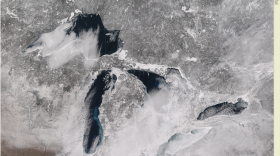-
Data from NOAA’s Great Lakes Environmental Research Laboratory show the Great Lakes are covered in ice. Here’s how much, what causes it, and some satellite photos of the coverage.
-
January is a time for winter sports in Michigan, including the small but growing sport of winter surfing in the frigid temps of the Great Lakes.
-
The week includes events in which the public can learn about microplastics, participate in cleanups and discover practical solutions to reduce plastic waste at home.
-
First, an Episcopal Bishop on the role of faith in the wake of gun violence. Then, more on the discovery of the wreck of the SS Carruthers, the last of the "Big 8" shipwrecks to be found.
-
What happens with public works are sold to private companies at a heavily discounted rate?Then, the discovery of a rare wildflower that only lives in one tiny corner of the Great Lakes.And, we revisit a conversation with Detroit visual artist Tyree Guyton, known for the Heidelberg Project.
-
First, an exploration of foreign land ownership in Michigan's Upper Peninsula. Then, a new take on brain imaging from University of Michigan researcher Changyang Linghu. Also, a deep-dive into the history of the sixth Great Lake that almost was with the Points North podcast.
-
A conversation on a Michigan summer classic — lightning bugs. Also, the Detroit community gathers for a collard green cookoff. Plus, an ophthalmologist becomes the first Michigander to win an open water swimming challenge.
-
Today, one man's fight to keep his home from being eaten by sand dunes. Also, Detroiters Tonya Mosley and Antonio Wiley on family loss and trauma with podcast She Has A Name. Plus, how the Great Lakes Fishery Commission met the threat of sea lamprey overpopulation in the Great Lakes and the film commemorating it.
-
Today, one man's fight to keep his home from being eaten by sand dunes. Also, Detroiters Tonya Mosley and Antonio Wiley on family loss and trauma with podcast She Has A Name. Plus, how the Great Lakes Fishery Commission met the threat of sea lamprey overpopulation in the Great Lakes and the film commemorating it.
-
First, new leadership at Stellantis. Then, two Michigan students talk DEI. And the ins-and-outs of shipwreck salvage from Points North.
Play Live Radio
Next Up:
0:00
0:00
Available On Air Stations





